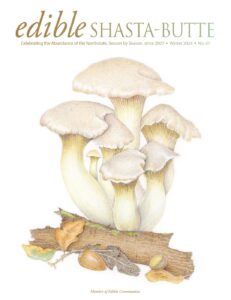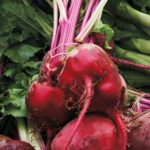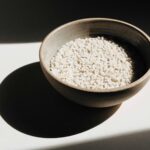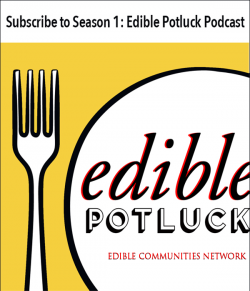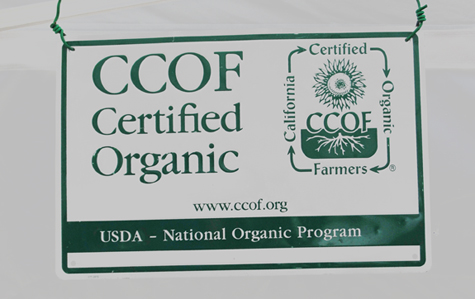
Many consumers are concerned with the level of pesticides and chemical fertilizers being used to produce food and are trying to make the switch to organically produced products. As a certified organic grower and farmers’ market vendor, I hear the questions about organic all the time. “What does organic mean?” “What does ‘no spray’ mean?” “What are ‘organic pesticides’?”
A recent article in the San Joaquin Agricultural Law Review defines organic foods as “those that are grown using ecologically friendly practices, without genetic modification, and without the use of any pesticides or fertilizers made from synthetic chemicals.” There is a certain amount of ambiguityin the phrase “using ecologically friendly practices,” but very clear intent about genetic modification and syntheticchemicals.
Genetic modification is an extreme approach to breeding plants to fend off pests, resist chemical herbicides, or survive in high salt or low temperatures conditions. These changes happen in a laboratory, not in the real world. At least they don’t happen in the short time frames that we humans deal with. There is universal agreement that any genetic modification is unacceptable in organic production.
Synthetic chemicals are produced with extremely high levels of petroleum inputs and concentrated to allow mass production, easy transport and application, and high response rates from plants. The high concentrations of nitrogen, the major nutrient for plant growth, cause plants to grow rapidly, but the faster growth does not mean better plants or food, just more of it. Everyone is familiar with tasteless tomatoes, bland corn, oversized, watery lettuce, and other commodities that lack the flavor and nutrients of food grown with better attention to the health of the soil, the plant, and the quality of the fruit or vegetable.
Plants with the high inputs from the simple nutrients of synthetic fertilizers tend to have less resistance to pest and weather and need other synthetic inputs to overcome these problems. This requires growers to bring in the pesticides, and once again, as with synthetic fertilizers, this practice masks the weaknesses of conventional food production: unfortunately the petroleum that is required by these synthetic fertilizers and pesticides is running out, and they are causing major ecological disruptions along the way, for example, high nitrates in drinking water and river mouths.
Organic producers that operate on a larger scale (more than $5000 income per year) must be certified by an independent agency registered and accredited by the state and federal governments. Many certifiers are providing this service to growers. The most widely used certifier in California is California Certified Organic Farmers (CCOF), and their familiar sunflower logo can be seen marking certified organic growers at most farmers’ markets. Certified producers are the consumer’s best bet to ensure the products meet the strictest standards of organic production. Certified producers go the extra mile and pay significant fees to give the consumers this highest level of insurance that they are meeting the goals of ecologically friendly farming.
This is not to say that all other products or producers are selling inferior products. Many growers use the same production inputs as certified organic producers for part of their operation but don’t want to deal with the regulation, fees, and inspections required to be certified. Consumers need to dig a little deeper with conventional producers and find the answers to questions about the practices of non-certified producers. Some products allowed in organic production, such as manure, are closely regulated in certified organic production. Timing of the application of raw manure and composting requirements for manure products are critical to maintain food safety. The use of manure is not regulated outside of organic certification, and consumers need to recognize that the products may not meet the standards of certified organic products.
Many products that farmers are using may seem to fit the organic rules but, if they are not registered and monitored by independent sources, may in fact be adulterated with synthetic products to enhance the results and the marketability of their products. With organic certification, this is closely monitored by the inspectors and the certification agencies, but not at all if the producer is not certified. Recent results of testing high nitrogen fish-based fertilizers found several examples of prohibited products mixed into the blend to increase nitrogen content and subsequently plant response. These products had to be discontinued and immediately removed from organic farms.
As certified organic producers, we continue to pay the fees, allow annual inspections, and closely review any and all products used on our farm for several reasons. In reality, our goal is to produce healthy soil that supports a broad range of microorganisms that work in concert with naturally produced cover crops and manures. This creates an environment where our trees and vegetables have the best opportunities to access a broad range of macronutrients, nitrogen, phosphorus, and potassium, and just as important, all the micronutrients such as calcium, magnesium, and iron. The broad spectrums of nutrients available in organically managed soil help plants grow better, healthier, and more resistant to disease and insect pests. It also allows the soil to sequester carbon dioxide from the atmosphere into the plants and microorganisms. Most important, all of this is accomplished without the petroleum based products so widely used in conventional production. This helps reduce cost, which offsets the organic inspection fees, and helps create a sustainable agricultural system that will be productive well past our time of stewardship of the land.
It seems this is what consumers really want to see, an agricultural system with the best guarantees of safety, quality, protection of water quality and wildlife, and long term sustainability. Certified organic producers provide these guarantees, certainly for consumers, but also for the future of our agriculture and planet.
Allen Harthorn grows Harpos Organics oranges, which he sells at the Saturday Chico Farmers’ Market as he answers questions about organic. His farm is certified by CCOF and he is an inspector for CCOF as well.



